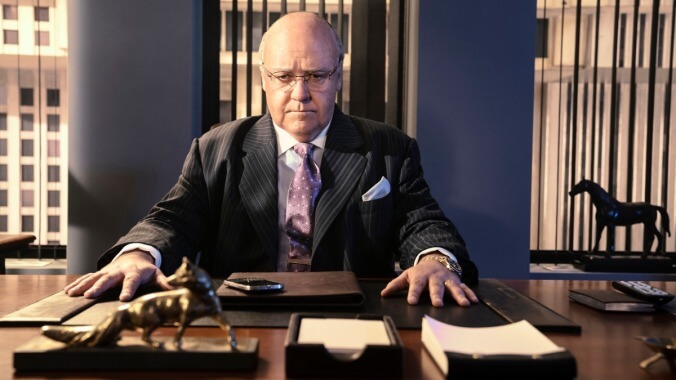Save for maybe Rupert Murdoch, there’s almost no one left who would even go through the motions of pretending to deny Fox News is anything but an outlet for right-wing propaganda. Even among its core viewership, that’s the appeal, not a smear. And as The Loudest Voice, Showtime’s new seven-part miniseries about Roger Ailes and his stewardship over the creation and rise of Fox News, demonstrates, that mission was the plan from the beginning. Still, it’s tough to not get at least a small chill from hearing the man responsible for mobilizing his cable channel into a tool for the most zealous and fact-free wing of the American far right summarize his ideology with willfully amoral audacity: “Don’t worry about what’s right or wrong… people don’t want to be informed— they want to feel informed.” The mustache twirl is implicit.
There’s a number of appealing elements to this story, adapted from reporter Gabriel Sherman’s book The Loudest Voice In The Room (and additional reporting he did for New York Magazine), but what immediately stands out is Russell Crowe. It’s not just because it’s the first time the actor has really subsumed himself into a Gary Oldman-esque transformation (mostly via prosthetics) to portray Ailes, a portly and balding creature of outsized appetites who ran Fox News with an iron fist until his ignominious ouster in 2016 following accusations of sexual harassment from multiple women. It’s that the miniseries provides Crowe with his richest and most compelling role in years. Save for a smattering of performances in films like The Nice Guys, Crowe hasn’t really found many roles worthy of his talents this decade; but in Ailes, he embodies a man who always acted the way Russell Crowe normally looks: like a larger-than-life character who expects the world to make way for his presence. His Ailes is fantastic, a reptilian schemer who seethes at the merest perceived slight, an overbearing egotist who nonetheless sold his Machiavellian vision through force of unexpected charisma and the assumption that rules should exist for others, not him.
The show breaks each episode down into a different year in the life of Ailes and Fox News, starting in 1995 with the creation of the channel, then excerpting particularly significant moments up to the end of his tenure: 2001, when Fox not-so-secretly became the lapdog mouthpiece for the Bush Administration’s war agenda; 2008, when the election of Barack Obama spurred an internecine power struggle with Rupert Murdoch to grant Ailes complete editorial control; 2009, when Ailes bought the small-town paper in his hometown (for purely petty reasons involving a zoning issue with his property) and turned it into a local equivalent of the wider culture war Fox was waging; and so on. At times, it can veer close to a “greatest hits” playlist of noteworthy occurrences, especially in the early going, when writer and exec producer Tom McCarthy struggles to build momentum during Ailes’ initial recruitment by Murdoch. But like McCarthy’s Oscar-winning Spotlight, the series soon excels by leaning into the behind-the-scenes workaday grind of Fox News, using the petty squabbles and political clashes (with the Obama administration, with other networks, and so on) to illuminate how a particularly craven mind was able to disregard journalistic ethics and single-handedly shift the Overton Window of political legitimacy in the United States to the right.
Make no mistake, Ailes was a true believer in his political mission, a hard-right ideologue who justified any means to achieve his repugnantly entitled ends. He rallied to his side those who could remain loyal to him no matter the cost to their own sense of right and wrong, as exemplified by Fox News’ former PR hatchet man Brian Lewis (Seth MacFarlane, smarmy and perfectly cast) or even Ailes’ own wife, Elizabeth (Sienna Miller). But as Ailes’ influence grew, so did his paranoia, and the show threads in plenty of flourishes—some subtle, some roaringly overt—to demonstrate his obsessive need for surveillance and supervision over his cable fiefdom. It feels clunky when there’s an entire scene dedicated to watching him oversee cameras installed in every square foot of the Fox News offices (only to get annoyed when the contractor expresses discomfort at installing them in the bathrooms); much better are the moments other characters glance worriedly at the omnipresent lenses on their way in and out the door, or the brief moment when Ailes enters his bedroom after a long day and we see a massive panic room-style security door slide shut behind him.
In the background of all these juicy media power struggles, however, is the much darker and distasteful story of Ailes’ sexual exploitation of the women in his orbit. What starts as a lighthearted observation about his outdated views on gender politics (his farewell speech to his CNBC staffers in ’95 references a “hot as a pistol” reporter he hired) soon pivots into outright criminal territory, as we see him harass or outright demand sexual satisfaction from women working for him, under threat of career suicide should they fail to go along. For the first half of the show, this is primarily conveyed via his encounters with Fox News exec Laurie Luhn (an excellent Annabelle Wallis), which begins with elegantly composed intimations of menace (flashes of her leaving his hotel room and so on) but soon shifts into blunt depictions of his coercion and sexual degradation of her, resulting in psychological torture that spanned two decades. These moments leave all understatement behind, shoving the audience’s face squarely into the horrific humiliation of these encounters. The scenes feel like the series indulging in the same cheap exploitation theatrics as the faux-news service it’s chronicling—they’re even shot like a horror movie. Mission accomplished: Ailes was a monster.
By the time Naomi Watts shows up as Gretchen Carlson, the on-air personality who would eventually lead the charge against Ailes’ vile behavior, the characterizations are clear, and the series’ effective combination of elegant media storytelling and salacious sexual nightmares has locked into its rhythms. The Loudest Voice blends West Wing-style operatics with a darker narrative about power most corrupting those who were already corrupt, and if it lacks Sorkin’s gift for whip-crack pacing, its excellent cast and dependable focus on the machinations of backroom deals keeps it fleet and engaging. As the show depicts Fox News steadily abandoning all public pretense of “fair and balanced” reporting over the years, in favor of conspiracy theories and wild-eyed racial animus, it’s clear what the series thinks actually happened to Ailes: His body may have died in 2017, but his vindictive, childish, aggrieved-victim spirit lives on in the cable channel that still propels his dangerously inflammatory culture-war rhetoric into the hearts and minds of millions who, in being told how to feel, are increasingly assured it’s okay to express that outrage with a little violence.


